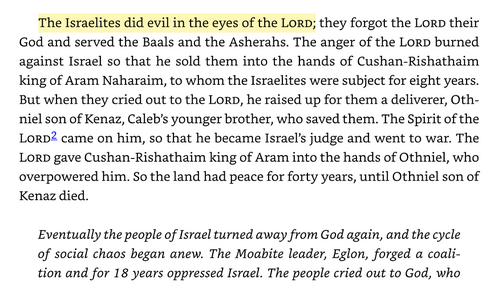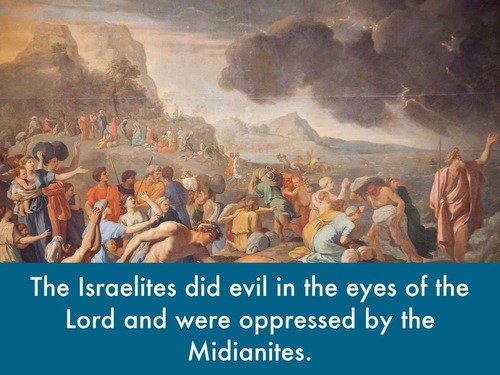The Story - Chapter 8
“The Israelites did evil in the eyes of the Lord.”

Did you notice that phrase throughout this chapter? Throughout the Book of Judges, as covered in Chapter 8 of The Story “A Few Good Men…and Women,” we hear the familiar refrain, “The Israelites did evil in the eyes of the Lord.” This phrase appears seven times throughout Judges, underscoring the repetitive nature of Israel’s disobedience (Judges 2:11, 3:7, 3:12, 4:1, 6:1, 10:6, 13:1). Each time, Israel’s turning from God leads to oppression by foreign enemies, followed by cries for help. In response, God raises up a judge to deliver them—a striking example of God’s persistent mercy to Israel.
The English word judge is a somewhat misleading label for those raised up by God. We today would probably call them more military leaders rather than our understanding of a judge. They are charismatic figures, in the sense that they are not officeholders to begin with, but are chosen for the task of dealing with a crisis because their abilities are recognized. And as you may have noticed, they are not necessarily chosen for their virtuous life…!
The English word judge is a somewhat misleading label for those raised up by God. We today would probably call them more military leaders rather than our understanding of a judge. They are charismatic figures, in the sense that they are not officeholders to begin with, but are chosen for the task of dealing with a crisis because their abilities are recognized. And as you may have noticed, they are not necessarily chosen for their virtuous life…!

One of the most interesting and inspiring judges in this book is Deborah, a prophet and leader, whose story is found in Judges 4-5 (pgs 105-106 in The Story.) At a time when Israel was oppressed by King Jabin of Canaan, Deborah was both a spiritual guide and military strategist. She called on Barak to lead Israel's forces against Jabin’s army, even though Barak was hesitant and would only agree if Deborah accompanied him. Deborah’s trust in God’s power and her willingness to lead highlights the courage required to fulfill God’s calling.
Deborah’s story is particularly meaningful from a United Methodist viewpoint. In her, we see that God’s deliverance can come through unexpected means, as God calls both men and women to serve. This aligns with our tradition’s affirmation of women in ministry, recognizing that the Holy Spirit empowers all people to carry out God’s work. In 1956 full clergy rights were granted to women in The Methodist Church (more info here), and still to this day women are full participants and leaders within our denomination. Deborah’s leadership and reliance on God’s strength encourage us to trust in God’s grace, no matter how daunting the challenge.
Deborah’s story is particularly meaningful from a United Methodist viewpoint. In her, we see that God’s deliverance can come through unexpected means, as God calls both men and women to serve. This aligns with our tradition’s affirmation of women in ministry, recognizing that the Holy Spirit empowers all people to carry out God’s work. In 1956 full clergy rights were granted to women in The Methodist Church (more info here), and still to this day women are full participants and leaders within our denomination. Deborah’s leadership and reliance on God’s strength encourage us to trust in God’s grace, no matter how daunting the challenge.

Chapter 8 of The Story reveals a pattern that should resonate deeply with all of us. Israel’s repeated failures mirror the human condition—a propensity to drift away from God. But the message of Judges is not one of hopelessness; rather, it is a message of hope rooted in God’s enduring grace. Every time the people cry out in their distress, God responds with mercy. This constant call back to faithfulness is a reminder that God never gives up on us, no matter how many times we fall short.
In our own lives, we experience similar cycles of faithfulness and failure. Like the Israelites, we may stray from God’s path, but God’s grace is always working to bring us back. This is an invitation to participate in God’s work of sanctification—the process of growing in holiness and love. The Book of Judges reminds us that even when we fail, God’s grace is sufficient, and His call to return is always open.
In our own lives, we experience similar cycles of faithfulness and failure. Like the Israelites, we may stray from God’s path, but God’s grace is always working to bring us back. This is an invitation to participate in God’s work of sanctification—the process of growing in holiness and love. The Book of Judges reminds us that even when we fail, God’s grace is sufficient, and His call to return is always open.
Recent
Archive
2025
January
2024
August
October
Categories
no categories

1 Comment
Thank you, I was unaware 1956 was when we recognized women in minstry.
nWas informative about Deborah and the view of A judge..
nThank you for brings these and other point forward.